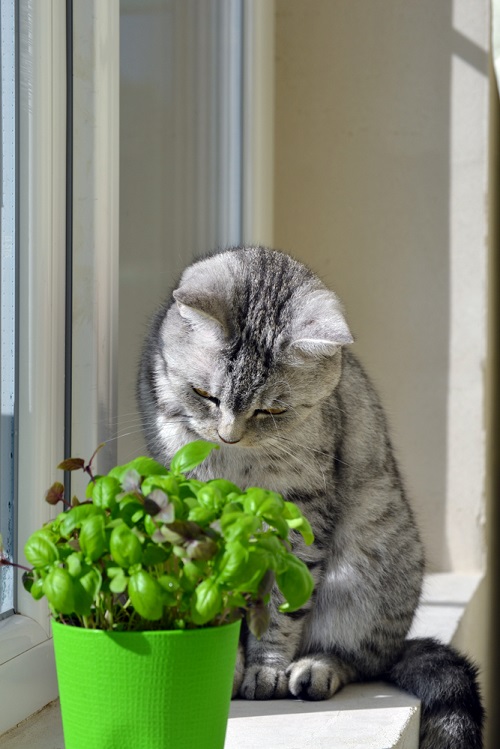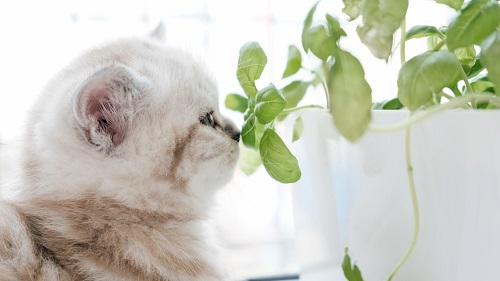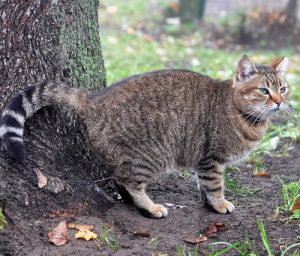Looking for ways to flavor your pet’s food? Look no further than this article! Can Cats Eat Basil? Let’s find out!
Are you curious if your feline friend can partake in the wonderful world of herbs? Well, look no further because we have got the lowdown on basil! It is a common kitchen staple that adds a burst of flavor to many dishes, but Can Cats Eat Basil too? The answer may surprise you.
Can Cats Eat Cilantro? Find out here
What Is Basil?

Basil is an aromatic herb that belongs to the mint family. It is a popular culinary condiment used in various dishes for its strong, sweet, and slightly peppery flavor. Basil leaves are typically bright green and come in different varieties, such as Sweet, Thai, and Holy basil.
Although native to the tropical regions of Central Africa and Southeast Asia, it is now widely cultivated worldwide. In addition to its culinary uses, basil also has medicinal properties and is used in traditional medicine to treat various ailments.
Can Cats Eat Basil?
So, Can Cats Eat Basil? You will be happy to hear that cats can eat basil! It can be a healthy addition to their diet when given in appropriate amounts. However, it should not be a regular part of their diet and should only be given as an occasional treat.
Is Basil Toxic For Cats?

Basil is generally considered non-toxic for cats. However, it is important to note that some cats may be allergic to it or other herbs, so it is always best to introduce new foods gradually and monitor your cat’s reaction. Additionally, it’s important to avoid feeding them large amounts of any herb or plant, including basil, as it can upset their digestive system.
Does Basil Contain Any Nutritional Value For Cats?
- Vitamins: Basil is a good source of vitamins A, C, and K, which are important for maintaining overall cat health.
- Minerals: Basil also contains minerals such as calcium, iron, and potassium, which are essential for various bodily functions in cats.
- Antioxidants: Basil contains antioxidants which can help protect cats against cellular damage caused by free radicals.
- Essential oils: Basil contains essential oils which have anti-inflammatory and anti-bacterial properties for cats when consumed in small amounts.
How To Feed Basil To Cats?
- Wash the basil leaves thoroughly before serving them.
- Fresh or dried basil leaves can be chopped or minced and sprinkled over cat food as a garnish or flavor enhancer.
- Make a homemade cat treat with chopped basil leaves mixed with other cat-safe ingredients like chicken or tuna.
- Brew fresh basil leaves in hot water and let them cool down before adding a small amount to your cat’s water bowl as a flavor enhancer.
A Few Concerns

- Some cats may be allergic to basil, which can lead to symptoms such as itching, sneezing, and gastrointestinal upset.
- If consumed in large quantities, basil may cause gastrointestinal problems in cats.
Can Cats Drink Basil Oil?
No, cats should not drink basil oil because it is highly concentrated and can be toxic to cats if ingested in large amounts. It can cause symptoms like vomiting, diarrhea, and lethargy.
Something Important!
- Consuming excess basil can lead to stomach upset and diarrhea in cats.
- Basil essential oils can be toxic to cats and should not be added to their diet in any form.
Can Cats Eat Basil? Quick Takeaways!
- Basil is safe for cats to eat in small quantities.
- Basil provides nutrients like essential vitamins, minerals, and antioxidants to cats.
- Fresh basil leaves can be served as garnishing over cat food and boiled to make a flavor enhancer drink.
- Consuming basil in large amounts can lead to stomach problems.
- Cats should not drink basil oil because of its highly concentrated nature.



